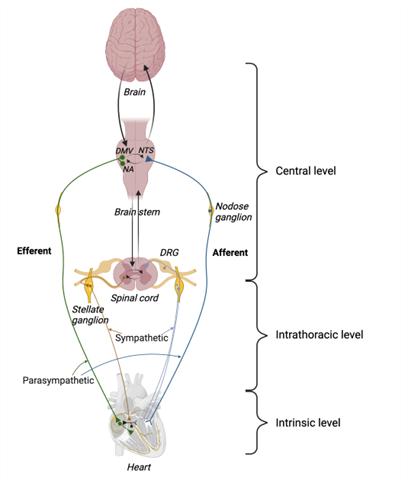Research Group: Cardiac Autonomic Nervous System (Dr. med. Stefanos Zafeiropoulos)
Our group builds upon the growing evidence that autonomic dysfunction contributes to the development and progression of cardiovascular diseases.
The autonomic nervous system’s dynamic balance between sympathetic and parasympathetic activity significantly influences cardiac physiology. Research indicates that the autonomic nervous system plays a pivotal role in the pathogenesis of various cardiovascular diseases, from atherosclerosis and hypertension to arrhythmias and heart failure. Our group builds upon the growing evidence that autonomic dysfunction contributes to the development and progression of cardiovascular diseases. Recent advances in technology and research methodologies have enabled a deeper exploration of the autonomic mechanisms involved. Moreover, there have been exciting developments in diagnostic tools and novel therapeutic interventions targeting the autonomic nervous system.
We delve into the molecular, cellular, and physiological aspects of autonomic regulation in cardiovascular physiology (Fig. 1). Our exploration includes cutting-edge diagnostic techniques such as advanced imaging modalities, wearable devices, and biomarkers. These innovations allow for precise assessment of autonomic involvement, potentially revolutionizing early detection and risk stratification. We also pursue therapeutic neuromodulation approaches targeting the autonomic nervous system to prevent, mitigate, or treat cardiovascular diseases (Fig. 2).
Overall, the aim of our research group is to explore the intricate relationship between the autonomic nervous system and various cardiovascular diseases. Finally, we strive to bridge the gap between basic research, clinical practice, and technological innovations in the field of cardiac autonomic nervous system. By doing so, we aim to provide a platform for interdisciplinary collaboration, accelerating the translation of scientific discoveries into improved patient care and ultimately enhancing the quality of life for individuals affected by cardiovascular disease.

Figure 1. A schematic representation of neural control of the heart. Autonomic control of the heart is comprised of a series of nested feedback loops, from the intrinsic neurons to the intrathoracic neurons and the central nervous system. DMV, Dorsal motor nucleus of the vagus, NTS, nucleus tractus solitarius, NA, nucleus ambiguus , DRG, dorsal root ganglion; ICNS, intracardiac nervous system. Modified from Hanna et al.

Figure 2. Autonomic Neuromodulation Therapies in Cardiovascular Diseases
